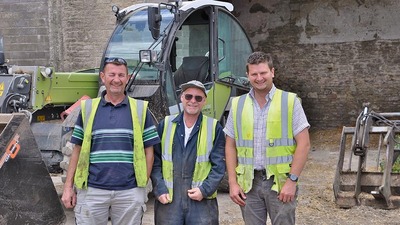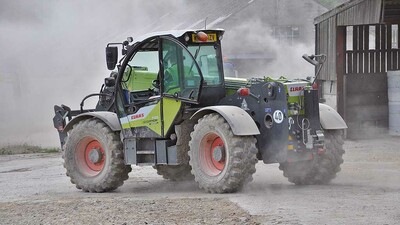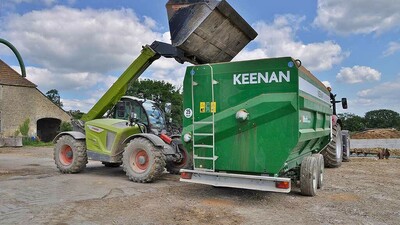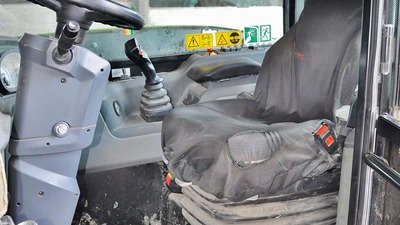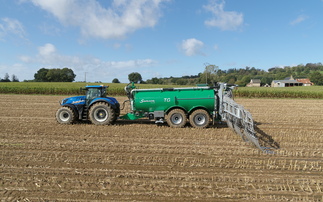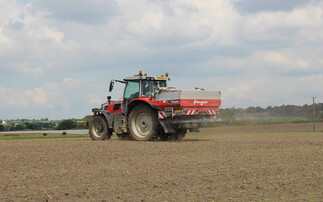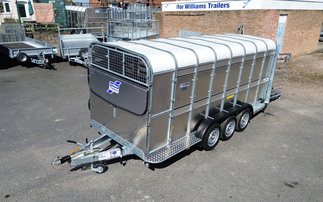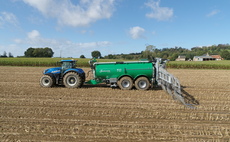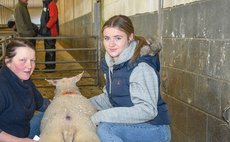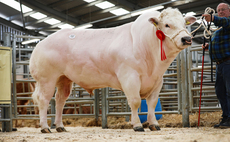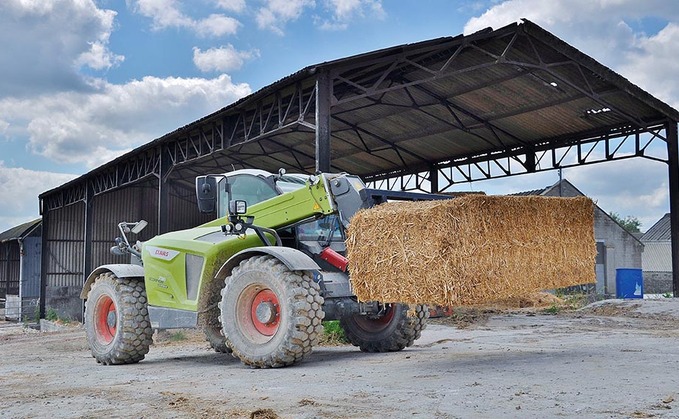
The Velcourt-managed Radstock-Cooperative Society, Somerset was one of the first UK farms to purchase one of the new generation of Liebherr built Claas Scorpion telehandlers.
Now with 3,600 hours under its belt, Simon Henley reports...
The latest range of Claas Scorpion telescopic loaders was officially debuted at Agritechnica 2017.
The new seven-model range had been eagerly anticipated, following a statement from Claas in July 2015 which had announced a new manufacturing alliance with construction equipment giant Liebherr.
As production of the former Claas Scorpion range, manufactured by Kramer, reached cessation, Claas dealers and their customers throughout Europe waited patiently for the new Liebherr models to arrive.
But was it worth the wait?
Arguably the most brutal environment for any telescopic handler is a dairy farm.
Working on a large-scale dairy unit not only demands the machine must work long hours, it also requires working in corrosive manure, mud, dirt and dust, frequently operating with heavy payloads in confined spaces, or pulling trailers loaded with silage and straw bales.
The Radstock Co-operative Society has farmed near Frome, Somerset, for more than 100 years.
Since 2010, this long-established 400-hectare farming business has been managed by Velcourt. Today, the farm milks 550 cows, in addition to growing 80ha of maize and 80ha of cereal crops.
The remainder of the ground is split between permanent pasture and grass silage leys.
The man at the helm of the Radstock Co-Op is Velcourt manager Ross Edwards, who oversees a seven strong team including two herdsmen.
The dairy herd here is permanently housed, with lactating cows visiting the parlour three times-a-day. Feeding and caring for the herd is not only a 365-day vocation for staff, it is one which requires reliable and dependable machinery, and above all else, this includes the farm's telehandler.
In January 2018, the farm bought a Claas Scorpion Varipower 736 (3.6 tonnes to seven metres) telehandler to replace a Claas Scorpion 7035 (3.5t to 7m).
Like its predecessor, it was procured on a two-year contract hire scheme with Claas' Maxi-Care cover, which provides full service/maintenance and warranty care for the duration of the contract.
Mr Edwards says: "Buying on a two-year contract hire scheme gives us cost transparency. It also gives us a guaranteed fixed cost during that period, which helps us with the financial forecast. Our tractors are purchased using the same type of scheme."
The new Scorpion is powered by a 136hp Deutz 3.6-litre, Stage 4-compliant engine, which produces 500Nm of torque at 1,600rpm. Drive to the wheels is provided by a three-range hydrostatic transmission, providing a top-speed of 40kph.
One of several key features available with the Scorpion is the firm's Smart-Load system, which integrates an optional automatic bucket return for loading operations with a set bucket position.
The system also enables stacked goods to be positioned with greater accuracy, by halving the speed of the working hydraulics at the flick of a switch.
In addition, the Scorpion's cab is a completely new design, which places the most frequently used controls in close proximity. At-a-glance systems information is provided by neatly positioned analogue gauges and a 3.5in data screen.
Mr Edwards says: "Our telehandler will clock about 2,500 hours per year. To date, our Scorpion has done 3,600 hours with only a few minor problems.
"The engine has tonnes of power and works very well with the hydro transmission. We tend to use the handler in ranges two and three.
"One of our initial concerns was the engine emissions system. However, it is virtually unobtrusive in normal use. Periodically, what I call the ‘puffer' light illuminates on the dash, and you have to let it stand for 20 minutes while it sorts itself out. This has only happened three times to date."
The main telehandler drivers at the Radstock Co-Op include Mark Collett and Kevin Gwynne. Both men report the new Scorpion cab as being quieter, with a more comfortable seat and an improved driving position, thanks to a greater range of steering wheel adjustment.
Also praised is the cab's improved visibility, which offers excellent overhead vision thanks to the extension of the windscreen into the cab roof.
As a further bonus, off-side vision has been improved by lowering the boom pivot point, so at rest the boom sits at bonnet height.
Mr Gwynne says: "One of the things I disliked about the old Scorpion was the foot throttle. The way in which it was positioned meant your foot was always raised in the air, which made your ankle ache.
"On the new model, the throttle can be used while you are resting your heel on the floor."
Mr Collett adds: "Another great feature of the new Scorpion is the LED lighting package. The way the lights are positioned, combined with the power of the LEDs, illuminates the entire area around the machine. I would recommend anyone who buys a Scorpion to add the lighting package."
Another highly praised option added to this machine is the 460/70 R24 Michelin BibLoad tyres.
Concrete
Mr Edwards says: "More than 90 per cent of the work we do is on concrete. During the day, the Scorpion is used for loading silage, straw and bulk feed products, in addition to cleaning out yards and loading muck.
"Working on concrete, we would typically expect to get about 1,500 hours from a set of conventional agricultural tyres. The BibLoad tyres lasted 3,000 hours.
"Not only are they harder wearing, they are also smoother riding and there is absolutely no compromise in traction, either on concrete or in the field."
A particular feature which helps make interchanging implements a simple task is the inclusion of two de-pressurisation buttons for the auxiliary hydraulic attachments; one button in the cab and one on the end of the boom.
The loader's joystick is reported as offering improved proportional control, with good lift response and the ability to operate two functions simultaneously (such as boom lift and bucket crowd) with greater proportional synchronisation.
This improved proportionality also applies to the use of the third services, allowing oilflow for auger buckets or sweeper buckets to be metered using a finger control.
Mr Edwards says: "As a whole, the hydraulic system on the new models offers far greater accuracy in the way you can control it.
"Claas has also improved the boom suspension. The old Scorpion used to blow accumulators with frustrating regularity."
Overall, this new Claas Scorpion 736 has so far proved to be a highly capable materials handler. However, as Mr Edwards explains, Claas still has some work to do before the new machine eclipses the mark of perfection.
He says: "Shortly after it arrived, the hydraulics started juddering while we were raising and lowering the boom. This was rectified by our local dealer, which replaced the hydraulic valve block and installed some new software. Since then, it has worked perfectly."
While the boom issue may have been resolved, one of the weakest elements on the new Scorpion has proved to be the hydraulic pick-up hitch, the performance of which is understatedly poor.
Mr Edwards says: "To be very blunt, the pick-up hitch is rubbish. It can barely lift an empty bale trailer high enough for the lock to engage, then you have the problem of releasing it.
"We have just had the Scorpion equipped with trailer air-braking, which was part of the original contract hire agreement.
Hitch
"Unfortunately, the inability of the hitch to currently cope with anything more than about 750kg of weight makes it hopeless for handling loaded trailers. In this respect, the hitch is as bad as the previous model."
This said, Mr Edwards would not say no to another one.
He says: "Our local Claas agent is Claas Western, based in Frome. The standard of service and the back-up we get from them is truly excellent.
"Let's face it, there is not a machine on the market which is perfect. It is the service you get from your dealer which counts.
"In general, I think the new Scorpion 736 Varipower is a superior machine to its 7035 predecessor.
"This was a brand new machine to the market when we bought it and it has consistently averaged 50 hours per week with only a couple of minor hiccups. Personally, I think that is pretty impressive."
